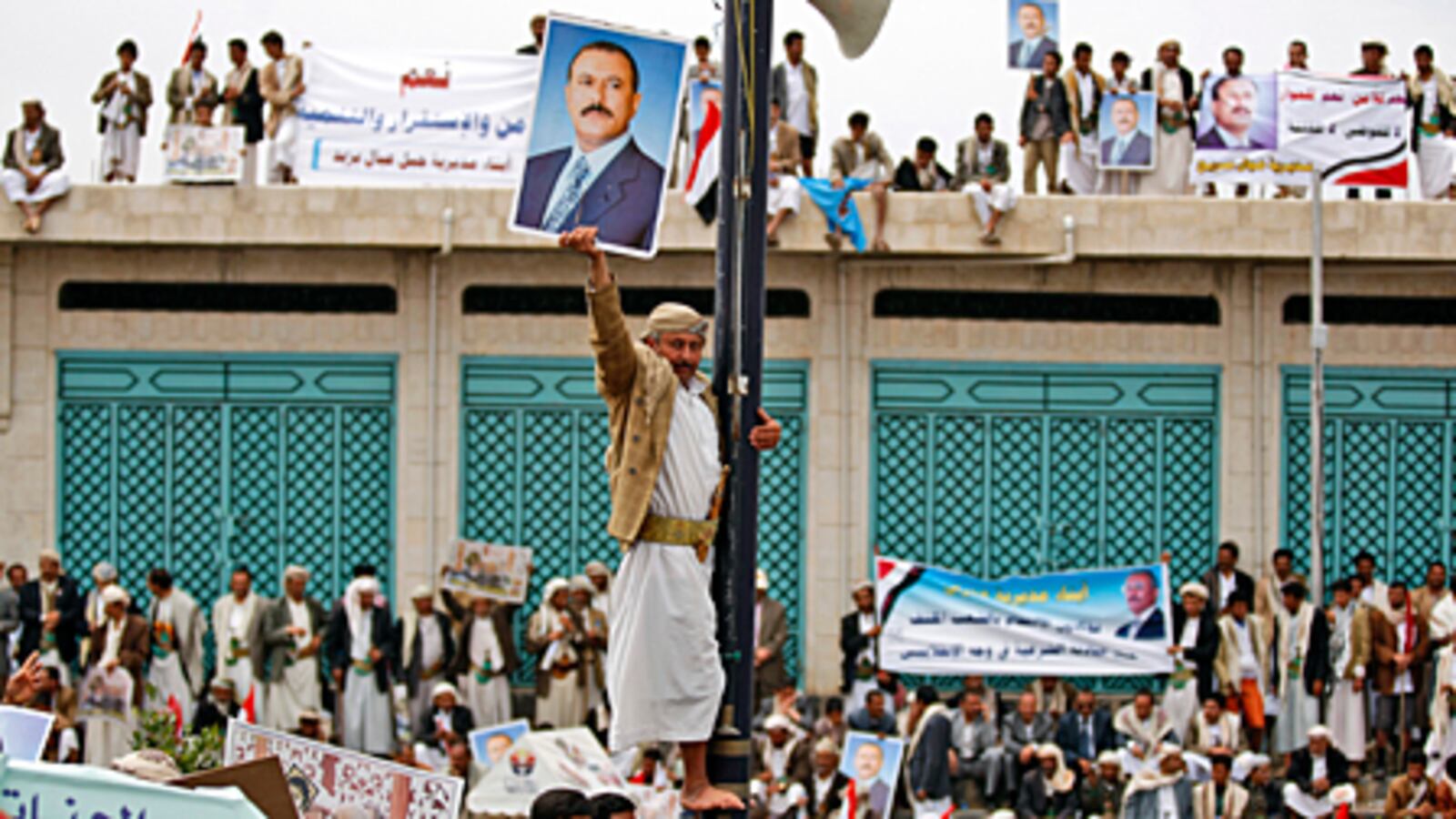Yemeni President Ali Abdullah Saleh appears to be facing the end, as his generals and diplomats desert him. Unlike the Khalifas in Bahrain, Saudi Arabia can't save Saleh even if it wanted to. Nor can Washington. What comes next is a mystery and perhaps anarchy. Al Qaeda in the Arabian Peninsula, which has attacked Detroit and Chicago already, will benefit.

Saleh is a proven survivor who has endured countless coup plots and a Saudi-sponsored civil war in 1995. He survived even his backing of Saddam in 1990. Part of his success was his capacity to convince former enemies like Riyadh and Washington to forget their grievances after 9/11 and see him as the only barrier to al Qaeda in Yemen. George Bush forgot his dad's hatred for Saleh, and Barack Obama inherited him as our man in Yemen.
But our man never really delivered. While Saleh did fight al Qaeda, it was never his first priority. He had much higher-priority targets. First was holding the country together in the face of continuing southern secessionism. Saleh is the uniter of Yemen. Aden and the rest of the south never really accepted the 1990 union and have sought to return to independence since.
Second: holding the north itself together in the face of repeated revolt by the Shia Huthi tribes who oppose Saleh's rapprochement with Riyadh and his efforts at centralizing power in Sanaa. These two challenges were always higher priorities for Saleh than al Qaeda in the Arabian Peninsula.
So far al Qaeda has been a bit player in the 2011 Arab revolt. Now it stands to be a big winner.
If America and Saudi Arabia paid him to fight al Qaeda, he was happy to take the money and pay lip service to the war with jihadism. He would turn his eyes away from drones and missile strikes. He would blame Iran for the Huthis to please Riyadh and Washington.
But Saleh could not escape the Jasmine winter of Arab revolution. A terribly weak economy, massive youth bulge and autocratic-nepotistic rule set him up as a prime candidate for revolution. All his enemies could agree he should go.
But they don't agree on what comes next. The south wants out of the union. The Huthis want to be left alone. The young want jobs that no one can deliver. The qat growers—Yemen's national narcotic and biggest cash crop—want water that doesn't exist. The oil is almost gone—and everyone knows that has been the only thing holding the country's economy together.
So if Saleh falls, his successor next will face almost insurmountable troubles. The country is over-populated, desperately poor and out of water and oil. Its unity is in doubt. If Riyadh tries to intervene, it will alienate Yemenis who hate their rich brothers. If Washington stands by Saleh too long, they will hate us too.
Al Qaeda in the Arabian Peninsula did not create this perfect storm and it is too small and weak to take over Sanaa. But it will probably have powerful Islamist friends in the next regime. In any case, fighting terrorism will not be Saleh's successor’s priority, either. If America is unpopular for its years of backing Saleh, al Qaeda will remind Yemenis it fought back and will target the U.S. even more.
So far al Qaeda has been a bit player in the 2011 Arab revolt. It was a marginal player in Tunisia and Egypt. It barely knew what to say.
Now it stands to be a big winner. It already has a secure base in Pakistan that is growing: now its base in Yemen will be even more secure. In chaos it will flourish. Whatever the merits of our war in Libya, the stakes are high in Yemen and our options few. The gulf monarchs in Riyadh, Abu Dhabi, Doha, Dubai, and elsewhere will soon face a bigger AQAP foothold on the peninsula. So will America's cities.
Bruce Riedel, a former long-time CIA officer, is a senior fellow in the Saban Center at the Brookings Institution. At Obama’s request, he chaired the strategic review of policy toward Afghanistan and Pakistan in 2009. He is author of the new book Deadly Embrace: Pakistan, America and the Future of the Global Jihad and The Search for Al Qaeda: Its Leadership, Ideology and Future.






